
James Joseph Tunney was an American professional boxer who competed from 1915 to 1928. He held the world heavyweight title from 1926 to 1928, and the American light heavyweight title twice between 1922 and 1923. A highly technical boxer, Tunney had a five-fight light heavyweight rivalry with Harry Greb in which he won three, lost once, and drew once, though many ringside reporters believed Greb should have won the decision in their second meeting. Tunney also knocked out Georges Carpentier and defeated Jack Dempsey twice; first in 1926 and again in 1927. Tunney's successful title defense against Dempsey remains one of the most famous bouts in boxing history and is known as The Long Count Fight. He retired undefeated as a heavyweight after his victory over Tom Heeney in 1928, after which Tunney was named Fighter of the Year by The Ring magazine.

The Hollywood Palace is an hourlong American television variety show broadcast Saturday nights on ABC from January 4, 1964, to February 7, 1970. Titled The Saturday Night Hollywood Palace for its first few weeks, it began as a midseason replacement for The Jerry Lewis Show, another variety show, which lasted only three months.
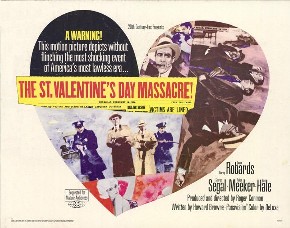
The St. Valentine's Day Massacre is a 1967 American gangster film based on the 1929 mass murder of seven members of the Northside Gang on orders from Al Capone. The picture was directed by Roger Corman, written by Howard Browne, and starring Jason Robards as Capone, Ralph Meeker as Moran, George Segal as Peter Gusenberg, and David Canary as Frank Gusenberg.
The Television Academy Hall of Fame honors individuals who have made extraordinary contributions to U.S. television. The hall of fame was founded by former Academy of Television Arts & Sciences (ATAS) president John H. Mitchell (1921–1988). Inductions are not held every year.

Edward Oxford was an English man who attempted to assassinate Queen Victoria in 1840. He was the first of seven unconnected people who tried to kill her between 1840 and 1882. Born and raised in Birmingham, he showed erratic behaviour which was sometimes threatening or violent. He had a series of jobs in pubs, all of which he lost because of his conduct. In 1840, shortly after being dismissed from yet another pub, he purchased two pistols and fired twice at Queen Victoria and her husband, Prince Albert. No-one was hurt.
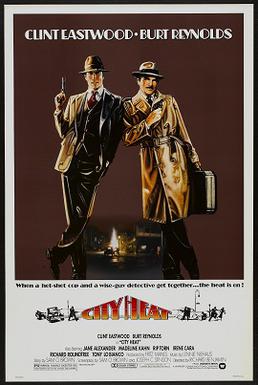
City Heat is a 1984 American buddy-crime comedy film starring Clint Eastwood and Burt Reynolds, written by Blake Edwards and directed by Richard Benjamin. The film was released in North America in December 1984.

Francis Charles Moran was an American boxer and film actor who fought twice for the Heavyweight Championship of the World, and appeared in over 135 movies in a 25-year film career.

Kid Galahad is a 1937 American sports drama film directed by Michael Curtiz and starring Edward G. Robinson, Bette Davis, Humphrey Bogart and, in the title role, rising newcomer Wayne Morris. A boxing film, it was scripted by Seton I. Miller and distributed by Warner Brothers. It was remade in 1941, this time in a circus setting, as The Wagons Roll at Night, also with Bogart, and in 1962 as an Elvis Presley musical. The original version was re-titled The Battling Bellhop for television distribution in order to avoid confusion with the Presley remake.
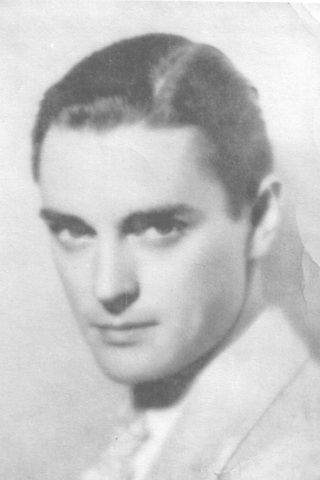
Edward James Nugent was an American film and stage actor.

Lucille Lund was an American actress. She is best known for her role in the film The Black Cat (1934).

Joan Barclay was an American film actress of the 1930s and 1940s, starring mostly in B-movies and cliffhangers, with her career starting during the silent film era.

Start Cheering is a 1938 American musical film directed by Albert S. Rogell and starring Jimmy Durante, Charles Starrett, Joan Perry, and Walter Connolly. It is best remembered today for guest appearances throughout the film by The Three Stooges, who were Columbia Pictures' short subject headliners at the time, as campus firemen. The film's choreography was by Danny Dare.

Behind Stone Walls is a 1932 American Pre-Code film directed by Frank R. Strayer and starring Edward J. Nugent, Priscilla Dean and Ann Christy.
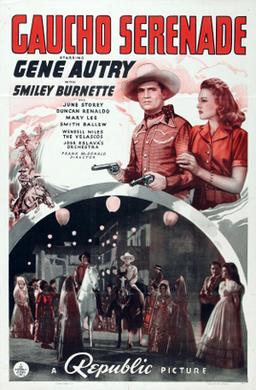
Gaucho Serenade is a 1940 American Western film directed by Frank McDonald and starring Gene Autry, Smiley Burnette, and June Storey. Written by Betty Burbridge and Bradford Ropes, the film is about a singing cowboy who goes up against a group of businessmen who plot to kidnap the son of a former partner so he won't testify against them.

The Big Guy is a 1939 American drama crime film directed by Arthur Lubin starring Victor McLaglen and Jackie Cooper.

Remote Control is a 1930 American pre-Code comedy film directed by Nick Grinde, Edward Sedgwick and Malcolm St. Clair and written by Frank Butler, F. Hugh Herbert and Jack Nelson. The film stars William Haines, Charles King, John Miljan, Polly Moran and J. C. Nugent.
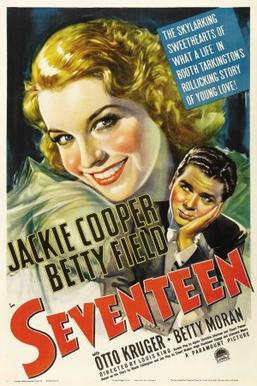
Seventeen is a 1940 American comedy film based upon the novel of the same name by Booth Tarkington and the subsequent play written by Stannard Mears, Hugh Stanislaus Stange and Stuart Walker. Directed by Louis King, the film stars Jackie Cooper, Betty Field, Otto Kruger, Ann Shoemaker, Norma Gene Nelson and Betty Moran. It was released on March 1, 1940, by Paramount Pictures.

The Kid from Kokomo is a 1939 American comedy film directed by Lewis Seiler and written by Richard Macaulay and Jerry Wald. The film stars Pat O'Brien, Wayne Morris, Joan Blondell, May Robson, Jane Wyman and Stanley Fields. The film was released by Warner Bros. on May 23, 1939.
The 1996 New Year Honours in New Zealand were appointments by Elizabeth II in her right as Queen of New Zealand, on the advice of the New Zealand government, to various orders and honours to reward and highlight good works by New Zealanders, and to celebrate the passing of 1995 and the beginning of 1996. They were announced on 30 December 1995.

















